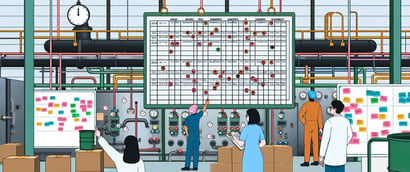Automated Scheduling Constraint Validation
Plant managers are constantly seeking ways to optimize production processes, reduce costs, and improve overall performance. One critical aspect of achieving these goals is effective scheduling, which ensures that resources are utilized efficiently and production runs smoothly.
Traditionally, scheduling in chemical manufacturing facilities has been a manual and time-consuming process, prone to errors and inefficiencies. However, with advancements in technology and the emergence of sophisticated software solutions, automated scheduling has become a game-changer for plant managers looking to streamline operations and stay ahead of the competition.
In this blog, we'll explore the concept of automated scheduling constraint validation and its significance in the chemical manufacturing industry. We'll look into how the integration of scheduling software, such as PlanetTogether, with enterprise resource planning (ERP), supply chain management (SCM), and manufacturing execution systems (MES), such as SAP, Oracle, Microsoft, Kinaxis, and Aveva, can revolutionize scheduling processes and drive operational excellence.

Manual Scheduling
Before looking into the benefits of automated scheduling constraint validation, let's first examine the challenges associated with manual scheduling in chemical manufacturing facilities.
Complexity of Operations: Chemical manufacturing involves intricate processes, diverse product lines, and numerous variables such as raw materials, equipment availability, and workforce constraints. Manually juggling these factors to create an optimized production schedule is a daunting task.
Human Error: Manual scheduling is susceptible to human error, whether it's overlooking critical constraints, inputting incorrect data, or failing to account for unforeseen disruptions. These errors can have costly repercussions, leading to production delays, inventory shortages, or equipment downtime.
Time-Consuming: Crafting a comprehensive production schedule manually is a time-consuming endeavor. Plant managers and scheduling teams spend significant hours analyzing data, coordinating with different departments, and making adjustments to accommodate changing priorities or constraints.
Limited Flexibility: Manual scheduling processes lack the agility needed to adapt to dynamic production environments. When faced with unexpected changes or disruptions, such as machine breakdowns or supply chain disruptions, manual schedulers may struggle to revise schedules quickly and efficiently.

Automated Scheduling Constraint Validation
Automated scheduling constraint validation offers a paradigm shift in how chemical manufacturing facilities approach production scheduling. At its core, it leverages advanced algorithms and artificial intelligence to automatically generate and optimize production schedules while ensuring compliance with various constraints and objectives.
Real-Time Data Integration: Integration between scheduling software like PlanetTogether and ERP, SCM, and MES systems enables seamless data exchange and real-time visibility into critical production parameters. By pulling data from multiple sources, including inventory levels, production capacities, and order priorities, automated scheduling systems can generate schedules based on the most up-to-date information.
Constraint-Based Optimization: Automated scheduling software considers a wide range of constraints, including equipment availability, labor resources, material availability, and production deadlines, to generate feasible and optimized schedules. By defining these constraints within the system, plant managers can ensure that schedules align with business goals and operational realities.
Scenario Analysis and What-If Simulations: One of the key advantages of automated scheduling is its ability to perform scenario analysis and what-if simulations. Plant managers can evaluate the impact of different scenarios, such as capacity changes, resource constraints, or order priorities, on production schedules before implementation. This proactive approach allows for better decision-making and risk mitigation.
Optimization Algorithms: Automated scheduling solutions employ sophisticated optimization algorithms to generate schedules that minimize production costs, maximize resource utilization, and meet customer demand. These algorithms take into account various factors, such as setup times, production sequences, and batch sizes, to create efficient and feasible schedules.

Integration with ERP, SCM, and MES Systems
The seamless integration of scheduling software with ERP, SCM, and MES systems is instrumental in unlocking the full potential of automated scheduling constraint validation. Here's how this integration enhances scheduling processes:
Data Accuracy and Consistency: Integration ensures that scheduling software has access to accurate and consistent data from ERP, SCM, and MES systems, eliminating discrepancies and errors caused by manual data entry or outdated information.
End-to-End Visibility: By integrating scheduling with ERP, SCM, and MES systems, plant managers gain end-to-end visibility into the entire production process—from order placement to delivery. This visibility enables better decision-making, improved coordination between departments, and enhanced responsiveness to changing market demands.
Streamlined Workflows: Integration streamlines workflows by automating data exchange and communication between different systems. For example, when an order is placed in the ERP system, it automatically triggers the generation of a production schedule in the scheduling software, ensuring timely execution without manual intervention.
Improved Traceability and Compliance: Integration facilitates traceability and compliance by maintaining a comprehensive audit trail of production activities, including scheduling changes, resource allocations, and order fulfillment. This audit trail not only ensures regulatory compliance but also enables continuous improvement through data analysis and optimization.
Automated scheduling constraint validation represents a paradigm shift in chemical manufacturing. By harnessing the power of advanced algorithms and real-time data integration, plant managers can optimize production schedules, minimize constraints, and drive operational excellence. The integration of solutions like PlanetTogether with leading ERP, SCM, and MES systems further amplifies the benefits, enabling a unified approach to planning and execution.
As we navigate through an era of unprecedented challenges and opportunities, embracing automated scheduling is no longer a choice but a necessity for chemical manufacturers seeking to thrive in a competitive landscape. It's time to unlock the full potential of your manufacturing operations and embark on a journey towards a future of efficiency, agility, and innovation.
Are you ready to take your manufacturing operations to the next level? Contact us today to learn more about how PlanetTogether can help you achieve your goals and drive success in your industry.